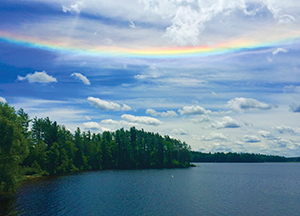
How wild will Boreas be?
Adirondack Daily Enterprise
May 11, 2016
NORTH HUDSON - The sun shone brightly and the black flies were out on the shores of Elk Lake Tuesday as Gov. Andrew Cuomo ceremonially sealed the state's purchase of the 20,700-acre Boreas Ponds tract from The Nature Conservancy.
"We're completing the largest acquisition to the Park in 100 years," Cuomo said. "The Boreas Ponds are one of the really magnificent parts of the Adirondacks. It is truly spectacular."
Much like the Elk Lake property, the nearby Boreas tract is home to a large lodge, built by the Finch, Pruyn paper company from which The Nature Conservancy bought the property. The Boreas lodge was one of several potential obstacles to achieving a wilderness designation for the land, as it would be considered a non-conforming structure. On Tuesday, however, it came out that TNC will demolish the lodge.
Mike Carr, executive director of TNC's Adirondack Chapter, said his organization is not taking a stance on the classification of the Boreas tract, but he did say all of the existing buildings on the property will be removed before TNC completely turns the property over to the state.
"We have responsibility for taking those down. It'll be over several years," Carr said. "There are lease camps on the property that have rights until 2018, and then we'll make sure that the state has a clean slate by 2020. That's our administrative responsibility. The lodge (is) the same thing. We have the opportunity to take that down and really just take it back to the way it once was."
Like Elk Lake, Boreas Ponds offer breathtaking views of Adirondack High Peaks like Marcy, Gothics, Skylight and Sawteeth. The Boreas tract also features 50 miles of rivers and streams, a variety of forests, and habitat for all kinds of animals.
The state paid TNC?$14.5 million for the tract, according to a deed filed April 5 in the Essex County clerk's office. That's an average of just $700 an acre.
With Boreas Ponds, TNC settles the final piece of the 161,000 acres it purchased in 2007 from Finch, Pruyn for $110 million. TNC sold 90,000 acres to a pension fund, which is logging the land under an easement that prevents development and allows some public recreation, and set aside 69,000 acres to sell to the state.
In 2012, Gov. Andrew Cuomo announced the state would spend $49 million to buy those 69,000 acres of former Finch property in phases over five years and add the lands to the "forever wild"
Adirondack Forest Preserve. Since then, the state has acquired the Essex Chain Lakes, OK Slip Falls, MacIntyre East and West, and other tracts.
"A moral accomplishment"
"The way we did it, I believe, preserves the balance between preservation and economic development, and I understand the passion on both sides," Cuomo said Tuesday. "Passion is what makes the Park special. The answer, obviously, is balance.
"You need to preserve the Park because it's the right thing to do, morally, as a citizen. And you need to preserve the Park because it is the asset that is attracting people."
Cuomo also noted the importance of Adirondack towns and villages needing to generate revenue and provide jobs. The Boreas Ponds land will remain on the tax rolls; as with all of the Forest Preserve that makes up nearly half of the Adirondack Park, the state will still pay property taxes to local governments and schools.
"Once in a rare while, you get a chance to do something that makes a difference forever, that literally leaves our children a place that is better than the place that we inherited," Cuomo said. "Today we know we are leaving our children a better North Country, a better Park than we inherited.
"It's not just an intellectual accomplishment; it's not just an economic accomplishment. It is a moral accomplishment. And today I can tell you, because I can hear it, the soul of the state of New York is singing because of what we did today."
Next up: Classify it
The next step is for the Boreas tract to be classified, which will determine the extent of public and recreational access allowed on the property. Cuomo sent a letter to the state Adirondack Park Agency, asking it to begin the process of classifying Boreas Ponds - but not indicating if he has a preference as to what kind of Forest Preserve it becomes.
Environmental groups are pushing for Boreas Ponds to be wilderness, the most restrictive type which bans most man-made structures as well as motorized uses like snowmobiles and bicycles. A coalition of eight groups, called Be Wild?New York, is pushing for Boreas Ponds to be added to the adjacent High Peaks Wilderness, which would grow from 204,000 to 280,000 acres and become roughly the same size as Rocky Mountain National Park in Colorado.
Some local officials want a combination of wilderness and the less-restrictive wild forest, which allows some structures and motorized uses.
The State Department of Environmental Conservation has suggested opening the 7 1/2-mile dirt road leading into the tract as far as LaBiere Flow, a dammed segment of the Boreas River about a mile before the ponds. Some wilderness advocates have argued for closing the whole road to let the tract return to a natural wild state.
"We'll stand down for now on that question and watch the process unfold," Carr said. "We have good science there, and that might be our role, to provide the science."
TNC has also established a fund of $750,000 to help the local towns' economic development. No specific projects have been decided on, but in the past, TNC has used similar funds to help businesses get established, such as gas stations and guide services.
"People were saying that they were hoping that small businesses would spring up," said Connie Prickett, who is director of communications for TNC's Adirondack Chapter. "And that's what we're seeing."
"This acquisition adds a dimension that we haven't had in the High Peaks, and that is wonderful opportunities for canoeing and kayaking," said Adirondack Mountain Club director Neil Woodworth. "The $750,000 that was announced today is as important as the acquisition. Up until now, there hasn't been places to eat and stay, and now there will be."
Since local towns have veto power over state land purchases, there are often compromises between the towns and environmental groups that allow for wilderness and increased access.
"There are some environmental groups who have not endorsed the Be Wild New York coalition because it includes access to within about a mile of the ponds, and it includes a snowmobile connector trail," Adirondack Council executive director Willie Janeway said. "It includes some compromises to take into account some of the other concerns of other stakeholders. Places for mountain bikes and motorized recreation while protecting the sensitive places is key."
"The Boreas Ponds tract really isn't one of those places where you can split the difference down the line," Woodworth said. "A lot of what we're hoping to do is to take one ecologically complete area and make it motor free. We have to work very very hard to classify this area as wilderness."





